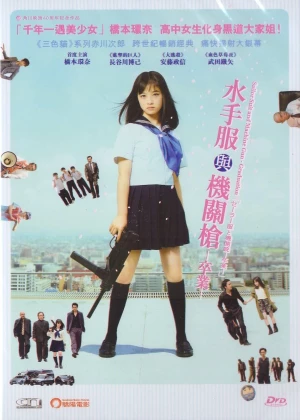Sailor Suit and Machine Gun: Graduation
35 years after Shinji Somai's classic, Koji Maeda figured it was time to bring back this franchise. Sailor Suit and Machine Gun: Graduation [Sera-fuku to Kikanju: Sotsugyo] is part sequel, part reboot, but it's mostly an excuse to put a high school girl in the lead of a Yakuza gang and have a little genre fun with that. I'll admit that my expectations were limited, but Maeda committed to the material and managed to upstage the original. It's a shame this film faded away almost immediately after its initial release, especially as availability wasn't that big of an issue.
![screencap of Sailor Suit and Machine Gun: Graduation [Sera-fuku to Kikanju: Sotsugyo]](/thumbs/img/articles/1200xauto/sailor-suit-machine-gun-graduation-1.webp)
It will surprise nobody that the film is a manga adaptation. Sailor suits (a reference to the high school uniform of female students) and machine guns generally don't mix, the idea that a female student is promoted to Yakuza boss is pretty outlandish too. As mad as it sounds, Somai's film was relatively down to earth, keeping the mangaesque elements to a minimum (but not eliminating them entirely) and putting more focus on the drama. Graduation flips that dynamic, making it more of a core genre film, with a little drama on the side.
The result is a Yakuza film that doesn't take itself too seriously, and compensates this lack of grit and gravity with plenty of flair and style. It's a tricky balance, and it explains why the film probably flunked upon release. Fans of Somai's adaptation won't be won by the more contemporary stylistic choices, whereas core crime fans will be put off by the addition of the sillier (though not overtly comedic) elements. For me personally, it puts the film in my sweet spot, as I usually need something extra to enjoy a good crime flick, but I'm aware that I'm the exception to the rule.
Izumi Hoshi disbanded her uncle's Yakuza clan and rebranded the remaining members. They are now running a small coffee shop in a quiet neighborhood. But Izumi is approached by a former rival gang and brought to their boss. They accuse her of selling drugs on their turf. Izumi suspects them of running a shady modelling agency in her neighborhood. Both groups are being played by a third gang, which needs to disrupt the current power balance to roll out their real estate scam. Izumi suspects that she's being set up, and she brings back her former clan.
![screencap of Sailor Suit and Machine Gun: Graduation [Sera-fuku to Kikanju: Sotsugyo]](/thumbs/img/articles/1200xauto/sailor-suit-machine-gun-graduation-2.webp)
The cinematography was a clear highlight for me. The camera work is energetic and creates a closeness to the characters, as well as making sure the action is a bit more dynamic. It also allows Maeda to explicitly play around with the lighting, which he does almost every opportunity he gets. It makes for a moody yet colorful film, but also one that is very reliant on and extremely forward with its style. For some it will take away from the drama and the crime setting, for others it will make it easier to be sucked into the film's peculiar universe.
The music is one of the weakest parts of the film. I think Graduation gets away with it because the cinematography shoulders most of the weight, but there is definitely some untapped potential. The music is rather generic and sparsely used. It is mostly there to fill voids and offer only the most basic of atmospheric cues. It's not that it is actively bad or detracts from the film, it's more that I had to go back and skip through the film again for this review, because it left no impression at all. And that's never a good sign.
The performances are on point, which is another part that Maeda nailed. The cast finds the perfect balance between serious and self-aware, allowing their characters to be larger-than-life, without needing to turn them into full-on stereotypical cardboard clichés. Hashimoto and Hasegawa work well as the central duo, but it's people like Masanobu Ando, Masato Ibu, and Kanji Furutachi who are allowed the most fun with their villainous characters. An opportunity they accepted with an appropriate amount of glee, adding to the overall entertainment value.
![screencap of Sailor Suit and Machine Gun: Graduation [Sera-fuku to Kikanju: Sotsugyo]](/thumbs/img/articles/1200xauto/sailor-suit-machine-gun-graduation-3.webp)
Even though I appreciated Somai's film, it's not one of my favorites in his oeuvre. I know many consider it one of his pivotal works, and it's one of the titles that revitalized the current interest in his body of work. I feel Somai's original took its subject matter a smidgen too seriously, whereas Graduation tilts the balance more to crazy genre fun, without going full-out bonkers. It's not going to be everyone's cup of tea, but I feel Maeda's film didn't get a proper chance to prove itself, there must be a bigger audience out there for prime crime/Yakuza entertainment like Graduation.
My expectations were relatively low going into this one, but that ended up being entirely unwarranted. Maeda turned out a slick and entertaining crime film, one that combines style, action, and a healthy dose of self-relativization with the usual Yakuza antics. I'm a little disappointed I didn't catch this film went it was originally released, but I'm glad I still took the leap almost a decade later. I would suggest people with a soft spot for Japanese crime cinema do the same. Sailor Suit and Machine Gun: Graduation may not be for everyone, but there's more than enough quality present for it to deserve a fair chance.
